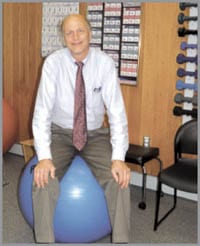The Personal Touch – Louis & Clark Has Built A Success Story In An Industry Dominated By Big Chains
When most people in Western Mass. think of pharmacy chains, they think of CVS, Walgreens, or Brooks. Those are the giants that dominate the region’s pharmaceutical landscape.
Louis & Clark, a 38-year-old chain boasting eight stores throughout Greater Springfield, isn’t on those companies’ level when it comes to total sales or advertising presence. So, how does this family-owned business manage to thrive, increasing its sales by 20{06cf2b9696b159f874511d23dbc893eb1ac83014175ed30550cfff22781411e5} annually over the past several years?
The chain’s success is built on a combination of factors, said Tracey Applebee-Cole, Louis & Clark’s vice president of operations, but it begins with a hometown, service-oriented approach that has gained customers mainly by word of mouth over the past three decades.
“Our philosophy is ‘health care solutions,’” she said. “We don’t say, ‘sorry, we can’t do that’; it’s ‘let’s see how we can do that for you.’ Our focus is on solving problems, not relying on a standard procedure and never deviating from it.”
That kind of flexibility has seen Louis & Clark become a niche-oriented company, with each of its stores having a different emphasis, from the Page Boulevard store in Springfield that focuses on medical equipment to the outlets in Baystate Medical Center and Mercy Medical Center which consult closely with the hospitals’ physicians to carry what they need most.
“We’ve determined the niche each particular area needs. We don’t have cookie-cutter stores like CVS or Walgreens,” Applebee-Cole said. “We go into whatever community we’re in and assess its needs. That’s our philosophy: tell us what you need, and we’ll find it for you.”
What Louis & Clark is finding is a growing customer base, one that is expected to expand further as the chain markets itself more aggressively than at any time in the past. It may not be one of the giants, but it’s clearly in business for the long haul.
Meeting Needs
Louis & Clark isn’t just a catchy name: it reflects the actual names of its founders, who still own the company today. Louis Demosthenous and Clark Matthews Sr. had worked at Airline Drug on Memorial Drive in Chicopee while attending pharmacy school. When they graduated in 1965, they bought the store and renamed it.
That flagship store remains in the same location today, in the former Ames plaza — practically in the shadow of brand-new CVS and Walgreens stores to the north, and a mile from supermarket-based pharmacies at Big Y and Stop & Shop to the south. Clearly, competition is fiercer than it was in 1965.
But Louis & Clark is also a bigger player, expanding quickly at first by adding stores on Breckwood Boulevard in Springfield in 1968 and Main Street in Wilbraham in 1971.
“Those were pretty much retail,” Applebee-Cole said. “The owners were very entrepreneurial, though. They were the first to computerize their pharmacies and the first to offer senior-citizen discounts, and patients liked that.”
The Page Boulevard store, which began the chain’s focus on niche service, went up in 1972.
“That’s when we got into the medical-equipment business, but we’ve also developed that store into facilities services and independent-living services,” Applebee-Cole said. That includes filling dose packages for people who are taking care of their parents, or mailing such packages to patients at home. “That’s been a very good niche for us. We can service a lot of at-home patients who can’t get out to a retail store.”
Demosthenous and Matthews held off further expansion for the next 16 years, then opened their first clinic pharmacy at Baystate in 1988 and followed that with another at Mercy three years later. Those pharmacies specialize in whatever the doctors in those buildings typically need — often medications and equipment that would have to be special-ordered by other stores. In those venues, Louis & Clark also serves as a consulting service to physicians on retail products.
A seventh outlet, at Holyoke Health Center, is also clinic-based. That pharmacy works closely with the center to make sure low-income patients have access to pharmaceuticals and programs to help them afford them.
Finally, the just-opened store in a medical building on Birnie Avenue in Springfield is an outgrowth of the original Baystate clinic, which has basically outgrown its 1,700-square-foot space. In addition to pharmacy features, the new, 3,000-square-foot store includes a compounding lab and an IV room.
And the chain isn’t done growing. Louis & Clark is currently looking at two additional locations, while Clark “Skip” Matthews Jr., the son of one of the founders, expects the company to increase its sales at least 11{06cf2b9696b159f874511d23dbc893eb1ac83014175ed30550cfff22781411e5} in 2003, from $28 million to $31 million. Given the chain’s sales growth over the past three years, that’s a conservative estimate.
Speed and Service
Skip Matthews said one reason Louis & Clark has thrived has been its refusal to sell out during an industry shakeup about a decade ago, when many small, independent pharmacies were bought out or simply driven out of business by larger chains.
Instead, he said, the company stayed true to its calling card: providing highly specialized service — instead of trying to be all things to all people — and doing it with the type of personal service that creates lifelong customers.
For instance, Louis & Clark prides itself on filling prescriptions in 15 to 20 minutes, not a couple of hours. “If you’ve got a sick kid and you’re rushing home from the doctor’s, we know your name, and we’re not going to make you wait two hours,” Applebee-Cole said.
“That’s one of the things that differentiates us from some of our competitors. From the customer-service surveys we’ve gotten back from patients, we know people like being able to get in and out as quickly as they can. That’s where most of our positive feedback comes from.”
There’s also the discount-card program for seniors. Many patients have seen such cards advertised on television and sold for a small fee, but Louis & Clark is the only regional pharmacy to offer such a cash-discount program free of charge.
Service touches like these are much of the reason why Louis & Clark has never placed much of a premium on marketing in the past. “To me, personally, the biggest compliment is that we have been able to survive just on word of mouth. The support of our customers has kept us going for almost 40 years. So obviously, we’re doing something right,” Applebee-Cole said.
The neglect of marketing is quickly becoming a thing of the past, however. In an age of information, Louis & Clark has finally begun to more aggressively put forth its name, hiring van Schouwen Associates to help the company craft an advertising strategy and get its message out.
“We’ve never had a brochure packet until now,” Applebee-Cole said. “Up until recently, we’ve spent very little time or effort on marketing. But the changes on Memorial Drive have made us rethink our marketing strategy.”
Prescription for Success
The new Louis & Clark pharmacy on Birnie Avenue is an ideal example of the customized programs the company has always attempted to provide. Its services include pharmaceutical, sterile, and veterinary compounding; private consultations; adult-immunization services; diabetes, asthma, transplant, and pain-management services; and delivery services.
That’s a far cry from that original retail-only store in Chicopee, but the company’s customers-first values — a crucial trait for a family-owned business — have remained at the forefront, Skip Matthews said. Both original owners are 61 years old, but they’re committed to guiding their legacy and have no plans to sell out to competition.
“The original mission statement was, ‘helping you take care of yourself,’ and that’s how they’ve grown the business,” Applebee-Cole said. “That philosophy has grown into ‘health care solutions,’ and if you can grasp those two concepts, you’ve got Louis & Clark. It’s about our people and our willingness to take the extra step for each patient.”
If anything, she said, the stores of the future will be designed pretty much like those of today — which means they’ll be just as different from one another.
“We don’t have cookie-cutter stores,” she reiterated. “That’s what customers like about us, and that’s certainly what they need.”
And, in an industry of often-impersonal giants, knowing what patients need is half the battle.


